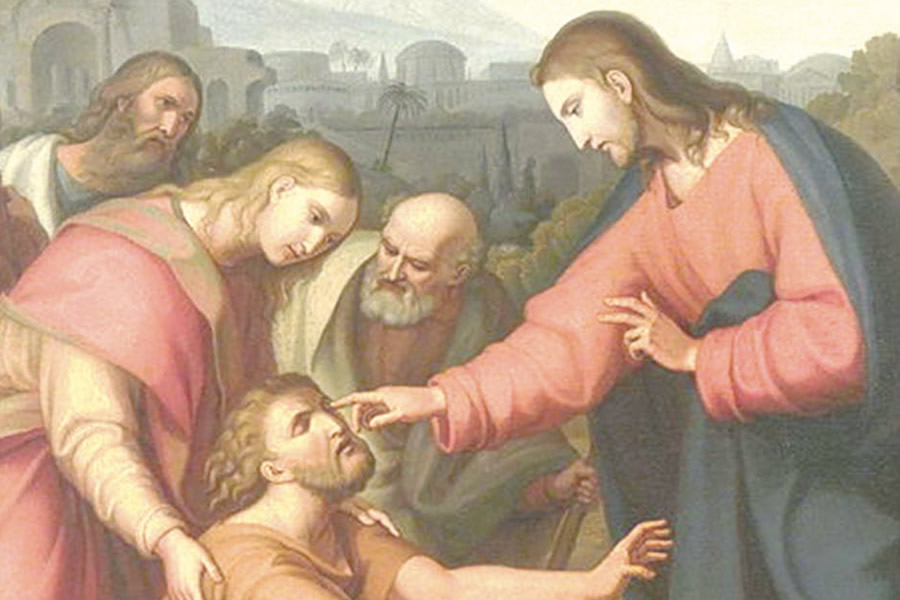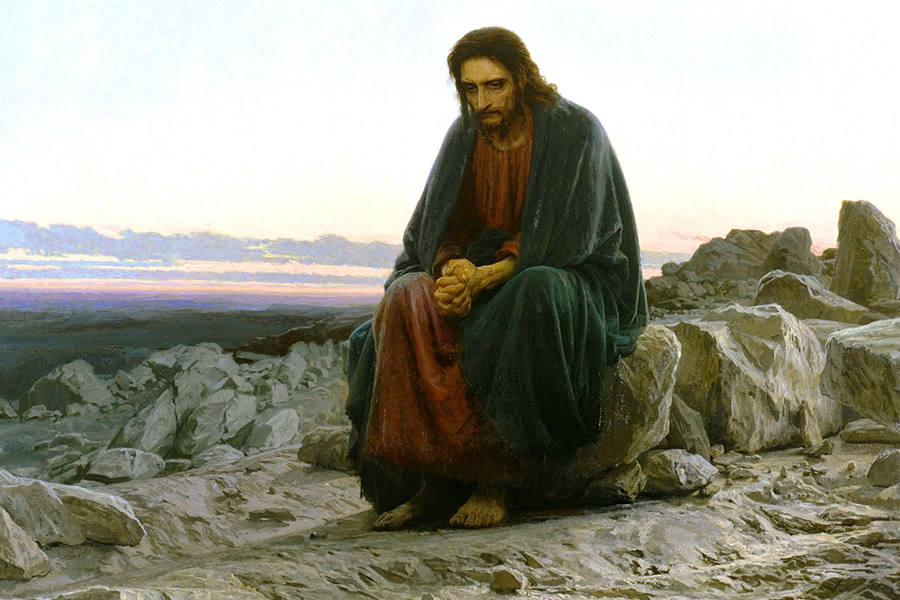St. Francis of Assisi Weekly Reflections
Life Everlasting
03-26-2023Question of the WeekReading I: Ezekiel 37:12-14 - Prophecy of restoration
Reading II; Romans 8:8-11 - The flesh and the Spirit
Gospel: John 11:1-45 - The raising of Lazarus
Key Passage: Jesus said to Martha, “I am the resurrection and the life. Those who believe in me, even though they die, will live, and everyone who lives and believes in me will never die. Do you believe this?” (John 11:25–26)
Adults: Christ calls us from death to new life. To what new life are you being called during this Lent?
Kids: How does Jesus help you do what is good and avoid what is not?
Vida Eterna
Lectura I: Ezequiel 37:12-14 - Profecía de restauración
Lectura II: Romanos 8:8-11 - La carne y el Espíritu
Evangelio: Juan 11:1-45 - La resurrección de Lázaro
Pasaje Clave: Jesús le dijo a Marta: “Yo soy la resurrección y la vida. El que cree en mí, aunque muera, vivirá, y todo el que vive y cree en mí, no morirá jamás. ¿Crees tu esto?” (Juan 11:25–26)
Adultos: ¿Cristo nos llama de la muerte a la vida nueva. ¿A qué nueva vida estás siendo llamado durante esta Cuaresma?
Niños: ¿Cómo te ayuda Jesús a hacer lo que es bueno y a evitar lo que no lo es?

I Am the Resurrection and the Life
03-26-2023Weekly ReflectionWe Celebrate Worship Resource, Vol. 48, No. 1Today we hear John’s dramatic account of Jesus raising Lazarus from the dead. Ezekiel foreshadows this event when he tells his people that one day God will raise them from their graves. God’s spirit will give them life. But that spirit is not accepted by all. In the Gospel, Jesus reveals to Martha, “I am the resurrection and the life,” and calls forth Lazarus from the tomb (John 11:25). John tells us that many who witness this event begin to believe. However, we don’t hear his next verse: “But some of them went to the Pharisees and told them what Jesus had done” (11:53). Restoring the life of his dear friend directly leads to the loss of his own. Jesus places a greater value on the life he gives that on the life he has. For the life that Jesus gains is the resurrected life in which we all share—the life, as Paul wrote, that God gives to our mortal bodies through the Spirit of God dwelling in us.
How does knowing that the Spirit of God dwells in you change your outlook on life?
Yo Soy La Resurrección Y La Vida
Hoy escuchamos el relato dramático de Juan sobre Jesús resucitando a Lázaro de entre los muertos. Ezequiel presagia este evento cuando le dice a su pueblo que un día Dios los levantará de sus tumbas. El espíritu de Dios les dará vida. Pero ese espíritu no es aceptado por todos. En el Evangelio, Jesús le revela a Marta: “Yo soy la resurrección y la vida”, y llama a Lázaro de la tumba (Juan 11:25). Juan nos dice que muchos de los que presencian este evento comienzan a creer. Sin embargo, no escuchamos su siguiente versículo: “Pero algunos de ellos fueron a los fariseos y les contaron lo que Jesús había hecho” (11:53). Restaurar la vida de su querido amigo conduce directamente a la pérdida de la suya. Jesús valora más la vida que da que la vida que tiene. Porque la vida que Jesús gana es la vida resucitada en la que todos compartimos, como escribió Pablo, que Dios da a nuestros cuerpos mortales a través del Espíritu de Dios que mora en nosotros.
¿De qué manera el saber que el Espíritu de Dios mora en ti cambia tu perspectiva de la vida?
Source of Light
03-19-2023Question of the WeekReading I: 1 Samuel 16:1b, 6-7, 10-13a - Samuel anoints David
Reading II: Ephesians 5:8-14 - Duty to live in the light
Gospel: John 9:1-41 - The man born blind
Key Passage: For once you were darkness, but now in the Lord you are light. Live as Children of light—for the fruit of the light is found in all that is good and right and true. (Ephesians 5:8–9)
Adults: What are you doing in your life right now to move toward light rather than darkness?
Kids: How can you let the light of your faith in Jesus shine for others to see?
Fuente De Luz
Lectura I: 1 Samuel 16:1b, 6-7, 10-13a - Samuel unge a David
Lectura II: Efesios 5:8-14 - Deber de vivir en la luz
Evangelio: Juan 9:1-41 - El ciego de nacimiento
Pasaje Clave: En otro tiempo ustedes fueron tinieblas, pero ahora, unidos al Señor, son luz. Vivan, por lo tanto, como hijos de la luz. Los frutos de la luz son la bondad, la santidad y la verdad. (Efesios 5:8–9)
Adultos: ¿Qué estás haciendo en tu vida en este momento para moverte hacia la luz en lugar de la oscuridad? ?
Niños: ¿Cómo puedes dejar que la luz de tu fe en Jesús brille para que otros la vean?

The Light of Christ
03-19-2023Weekly ReflectionWe Celebrate Worship Resource, Vol. 48, No. 1Can we see with eyes of faith? The blind man in the Gospel cannot see at all, but after Jesus heals him he comes progressively closer to seeing with eyes of faith. “The man called Jesus” becomes “a prophet,” then one “from God,” and finally the “the Son of Man” and “Lord” (John 9:11, 17, 33, 35, 38). Meanwhile, the Pharisees—with no apparent visual impairment—become more and more spiritually blind, failing to see past their own misconceptions of sin and disability. In the first reading, Samuel also initially fails to see as God sees, but comes to recognize David as Saul’s heir. Jesus tells his disciples, “While I am in the world, I am the light of world” (John 9:5). Let us remind ourselves that Jesus still is in the world: in us as we gather here together, in the Eucharist, in the person in need, and within ourselves as we act in his name. May the light of Christ, which “produces every kind of goodness and righteousness and truth” (Ephesians 5:9), give us eyes of faith, allowing us to see as God sees so that we can see peace where others see conflict, hope where others see despair, love where others see enmity.
With the light of Christ in you, what goodness, righteousness, and truth can you produce for all to see?
La Luz De Cristo
¿Podemos ver con los ojos de la fe? El ciego del Evangelio no puede ver nada, pero después de que Jesús lo sana, se acerca progresivamente a ver con los ojos de la fe. “El hombre llamado Jesús” se convierte en “un profeta”, después en uno enviado “de Dios”, y finalmente el “Hijo del Hombre” y “Señor” (Juan 9:11, 17, 33, 35, 38). Mientras tanto, los fariseos, sin discapacidad visual aparente, se vuelven cada vez más ciegos espiritualmente, y no pueden ver más allá de sus propios conceptos erróneos sobre el pecado y la discapacidad. En la primera lectura, Samuel inicialmente tampoco ve como Dios ve, pero llega a reconocer a David como el heredero de Saúl. Jesús les dice a sus discípulos: “Mientras estoy en el mundo, soy la luz del mundo” (Juan 9:5). Recordemos que Jesús todavía está en el mundo: en nosotros cuando nos reunimos aquí, en la Eucaristía, en la persona necesitada, y dentro de nosotros mismos cuando actuamos en su nombre. Que la luz de Cristo, que “produce toda clase de bondad, justicia y verdad” (Efesios 5:9), danos ojos de fe, permitiéndonos ver como Dios ve para que podamos ver paz donde otros ven conflicto, esperanza donde otros ven desesperación, amor donde otros ven enemistad.
¿Con la luz de Cristo en ti, ¿qué bondad, justicia y verdad puedes producir para que todos la vean?

Living Water
03-12-2023Weekly ReflectionWe Celebrate Worship Resource, Vol. 48, No. 1Water. Without it, we would not long survive. In ancient times, entire villages and towns would develop around a reliable well. In today’s Gospel, we meet a Samaritan woman on a daily trip to Jacob’s well. There she meets a stranger who offers her a different kind of water: water that will quench one’s thirst forever, “water welling up to eternal life” (John4:14). This living water, water the woman dearly wants as soon as she hears of it, is the very water poured over us in baptism. We already have within ourselves the living water that Jesus offers. This living water can satisfy so many of our thirsts: our thirst for eternal life, our thirst for meaning, our thirst for God. In the Sinai desert, the Lord gave life sustaining water to the Chosen People despite their grumbling. At Jacob’s well, Jesus slaked the deep thirst of the Samaritan woman despite her checkered past. In Jesus, God pours out of the water of eternal life despite our sinfulness. To this we testify
How does Jesus satisfy your thirst? How can your share that with others?
Agua Viva
Agua. Sin ella, no sobreviviríamos muchotiempo. En la antigüedad, pueblos yciudades enteras se desarrollaban alrededor de un pozo. En el evangelio de hoynos encontramos con una mujer samaritana enun viaje diario al pozo de Jacob. Allí conoce aun extraño que le ofrece otra clase de agua: agua que saciarála sed para siempre, “agua que brota para vida eterna” (Juan4:14). Esta agua viva, el agua que la mujer anhela tan prontocomo la oye, es el agua misma que se derrama sobre nosotrosen el bautismo. Ya tenemos dentro de nosotros el agua vivaque ofrece Jesús. Esta agua viva puede saciar muchas denuestras sed: nuestra sed de vida eterna, nuestra sed desentido, nuestra sed de Dios. En el desierto del Sinaí, el Señorle dio agua vital al Pueblo Elegido a pesar de sus quejas. En elpozo de Jacob, Jesús sació la profunda sed de la mujersamaritana a pesar de su pasado accidentado. En Jesús, Diosbrota del agua de la vida eterna a pesar de nuestrapecaminosidad. De esto damos testimonio.
¿Cómo satisface Jesús tu sed? ¿Cómo puedes compartir esocon los demás?
Source of Strength
03-12-2023Question of the WeekReading I: Exodus 17:3-7 - Water from the rock
Reading II: Romans 5:1-2, 5-8 - Faith, Hope, and Love
Gospel: John 4:5-42 - The Samaritan woman at the well
Key Passage: Jesus said to her, “Everyone who drinks of this water will be thirsty again, but those who drink of the water that I will give them will never be thirsty. The water that I will give will become in them a spring of water gushing up to eternal life.” (John 4:13–14)
Adults: Where have you found a source of “living water” for your own journey of faith?
Kids: Name some times when your belief in Jesus helped make you stronger.
Fuente De Fuerza
Lectura I Éxodo 17:3-7 - Agua de la roca
Lectura II Romanos 5:1-2, 5-8 - Fe, esperanza y amor
Evangelio: Juan 4:5-42 - la mujer samaritana en el pozo
Pasaje Clave: Jesús le dijo: “El que bebe de esta agua vuelvea tener sed. Pero el que beba del agua que yo le daré, nuncamás tendrá sed; el agua que yo le daré se convertirá dentro deél en un manantial capaz de dar la vida eterna”. (Juan 4:13–14)
Adultos: ¿Dónde has encontrado una fuente de “agua viva”para tu propio camino de fe?
Niños: Menciona algunos momentos en los que tu creencia enJesús te ayudó a fortalecerte.

Listen to Him
03-05-2023Weekly ReflectionWe Celebrate Worship Resource, Vol. 48, No. 1Jesus’ transfiguration, of which we hear today, comes at a pivotal time in his mission. He has just told his disciples that he must go to Jerusalem, where he will be killed, then raised on the third day. Peter, who had just confessed Jesus as the Messiah, immediately rebukes him. Jesus responds, “Get behind me, Satan!” (Matthew 16:23), for Peter is denying the Messiah’s true mission. He then tells his disciples that they must deny themselves, take up their crosses, and follow him. “Whoever loses his [or her] life for my sake will find it” (16:25). One week later, Jesus leads his closest disciples up the mountain. They are likely still dumbfounded by his demanding words. Now, while he is transfigured, they hear God say the words as when Jesus was baptized, but this time adding, “Listen to him” (17:5). My beloved Son told you he would have to suffer and die. Listen to him. He told you he would be raised. Listen to him. He told you that you must deny yourself and take up your cross. Listen to him. Two thousand years later our transfigured Lord challenges us to do the same. Listen to him.
What cross is Jesus asking you to bear? Are you ready to accept that challenge?
Escúchenlo
La transfiguración de Jesús, de la que escuchamos hoy, llega en un momento crucial en su misión. Acaba de decir a sus discípulos que debe ir a Jerusalén, donde lo matarán y resucitará al tercer día. Pedro, que acababa de confesar a Jesús como el Mesías, inmediatamente lo reprende. Jesús le dice: "¡Quítate de delante de mí, Satanás!" (Mateo 16:23), pues Pedro está negando la verdadera misión del Mesías. Luego les dice a sus discípulos que deben negarse a sí mismos, tomar sus cruces y seguirlo. “El que pierda su vida por causa de mí, la hallará” (16:25). Una semana después, Jesús lleva a sus discípulos más cercanos a la montaña. Es probable que todavía estén estupefactos por sus exigentes palabras. Ahora, mientras está transfigurado, escuchan a Dios decir las palabras como cuando Jesús fue bautizado, pero esta vez agregó: “Escúchenlo” (17:5). Mi amado Hijo os dijo que tendría que sufrir y morir. Escúchenlo. Les dijo que sería resucitado. Escúchenlo. Les dijo que deberían negarse a si mismos y tomar su cruz. Escúchenlo. Dos mil años después, nuestro Señor transfigurado nos desafía a hacer lo mismo. Escúchenlo.
¿Qué cruz te pide Jesús que lleves? ¿Estás listo para aceptar ese desafío?
Call to Faithfulness
03-05-2023Question of the WeekReading I: Genesis 12:1-4a Call of Abraham
Reading II: 2 Timothy 1:8b-10 Exhortation to faithfulness
Gospel: Matthew 17:1-9 Jesus transfigured
Key Passage: Six days later, Jesus took with him Peter and James and his brother John and led them up a high mountain, by themselves. And he was transfigured before them, and his face shone like the sun, and his clothes became dazzling white. (Matthew 17:1–2)
Adults: What difference does your faith in Jesus Christ make in your life?
Kids: What does it mean to you to be a holy person?
Llamado a la Fidelidad
Lectura I: Génesis 12:1-4a Llamado de Abraham
Lectura II: 2 Timoteo 1:8b-10 Exhortación a la fidelidad
Evangelio: Mateo 17:1-9 Jesús transfigurado
Pasaje Clave: En aquel tiempo, Jesús tomo consigo a Pedro, a Santiago, y a Juan, el hermano de éste, y los hizo subir a solas con él a un monte elevado. Ahí se trasfiguró en su presencia: su rostro se puso resplandeciente como el sol y sus vestiduras se volvieron blancas como la nieve. (Mateo 17:1–2)
Adultos: ¿Qué diferencia hace tu fe en Jesucristo en tu vida?
Niños: ¿Qué significa para ti ser una persona santa?
Overcoming Temptation
02-26-2023Question of the WeekReading I: Genesis 2:7-9; 3:1-7 - The fall of humankind
Reading II: Romans 5:12-19 - Humanity’s sin through Adam
Gospel: Matthew 4:1-11 - The temptation of Jesus
Key Passage: Jesus was led up by the Spirit into the wilderness to be tempted by the devil. (Matthew 4:1)
Adults: What helpful advice could you offer someone faced with a temptation?
Kids: What helps you do the right thing when you want to do something wrong?
Vencer La Tentación
Lectura I: Génesis 2:7-9; 3:1-7 - La caída de la humanidad
Lectura II: Romanos 5:12-19 - El pecado de la humanidad a través de Adán Evangelio: Mateo 4:1-11 - La tentación de Jesús
Pasaje Clave: Jesús fue conducido por el Espíritu al desierto para ser tentado por el demonio. (Mateo 4:1)
Adultos: ¿Qué consejo útil podrías ofrecer a alguien que se enfrenta a una tentación?
Niños: ¿Qué te ayuda a hacer lo correcto cuando quieres hacer algo malo?

Resisting Temptation
02-26-2023Weekly ReflectionWe Celebrate Worship Resource, Vol. 48, No. 1To be human is to be tempted. All of us are tempted, sometimes quite often, to do something we know we shouldn’t or to shirk a responsibility to do something we should. Adam and Eve are both tempted in the garden of Eden. The serpent cunningly makes the prospect of eating the fruit of the fateful tree both innocuous and appealing. Eve and Adam hardly hesitate before succumbing to temptation. Jesus, fully divine and fully human, is tempted as well. Three times he is tempted by the devil in the desert. Each time Jesus resist, responding with words from scripture, the word to which he was sent to testify, the word he enfleshes. We are likely to be tempted many times during this season of Lent, and not only regarding our Lenten commitments. Jesus himself has provided a model of resisting. Recall that the Holy Spirit, who descended upon Jesus at his baptism, accompanies him in the desert. As baptized Christians, the Holy Spirit accompanies us as well. May the Holy Spirit strengthen us as we face temptation.
Recall a time recently when you gave in to temptation. How will you resist temptation like that the next time?
Resistiendo La Tentación
Ser humano es ser tentado. Con frecuencia nos sentimos tentados a hacer algo que no debemos o eludimos responsabilidades de lo que debemos hacer. Adán y Eva fueron tentados en el jardín del Edén por la serpiente a comer el fruto, del árbol prohibido. Ellos apenas dudaron de caer en la tentación. Jesús, plenamente divino y plenamente humano, también es tentado. Tres veces es tentado por el diablo en el desierto. Cada vez que Jesús resiste, responde con palabras de la Escritura, la palabra de la que fue enviado a testificar, la palabra que encarna. Es probable que seamos tentados muchas veces durante esta temporada de Cuaresma, y no solo con respecto a nuestros compromisos de Cuaresma. Jesús mismo ha proporcionado un modelo de resistencia. Recordad que el Espíritu Santo, que descendió sobre Jesús en su bautismo, le acompaña en el desierto. Como cristianos bautizados, el Espíritu Santo también nos acompaña. Que el Espíritu Santo nos fortalezca al enfrentar la tentación.
Recuerda alguna reciente ocasión en la que cediste a la tentación. ¿Cómo resistirás una tentación como esa la próxima vez?
Love of Enemies
02-19-2023Question of the WeekReading I: Leviticus 19:1-2, 17-18 - Various rules of conduct
Reading II: 1 Corinthians 3:16-23 - The work of God’s ministers
Gospel: Matthew 5:38-48 - New law of retaliation; love of enemies
Key Passage “You have heard that it was said, ‘You shall love your neighbor and hate your enemy.’ But I say to you, Love your enemies and pray for those who persecute you.” (Matthew 5:43–44a)
Adults: What is the point of “turning the other cheek” in an argument, and why is it so hard to do?
Kids: Who are the people you find it most difficult to forgive?
Amor De Los Enemigos
Lectura I: Levítico 19:1-2, 17-18 - Varias reglas de conducta
Lectura II: 1 Corintios 3:16-23 - La obra de los ministros de Dios
Evangelio: Mateo 5:38-48 - Nueva ley de represalias; amor de enemigos
Pasaje Clave: “Han oído ustedes que se dijo: Ama a tu prójimo y odia a tu enemigo; yo, en cambio les digo: Amen a sus enemigos, hagan el bien a los que los odian y rueguen por los que los persiguen.” (Mateo 5:43–44a)
Adultos: ¿Cuál es el punto de “poner la otra mejilla” en una discusión y por qué es tan difícil de hacer?
Niños: ¿Quiénes son las personas a las que les resulta más difícil perdonar?

Love Your Enemies
02-19-2023Weekly ReflectionWe Celebrate Worship Resource, Vol. 48, No. 1In the last sentence of today’s Gospel, Jesus exhorts his disciples to be perfect. But who among us is perfect? Who could be? We all fail from time to time, and that is the reason the gifts of forgiveness, reconciliation, and ultimately, redemption are so precious. It is with these gifts in mind that we should follow Jesus’ directives to love our enemies, to turn the other cheek, to give even more generously to those who take from us. It is so easy to find fault with each other in so many ways. We should take the time to look at the world from God’s point of view. Approximately eight billion people living on this planet and every one of them is a child of God. God would not refuse a single one of them sunshine or rain. God would not refuse a single one of them forgiveness, reconciliation, or redemption. To God, we are all sisters and brothers. When Jesus called on his disciples to be perfect, he reminded them that their heavenly Father is perfect. May the perfection with which God loves all the children of the world motivate us to try to do the same.
Can you accept the demand to love your enemies? How does loving your enemies transform the way you feel about yourself?
Ama A Tus Enemigos
En la última frase del Evangelio de hoy, Jesús exhorta a sus discípulos a ser perfectos. Pero, ¿quién de nosotros es perfecto? ¿Quién podría ser? Todos fallamos de vez en cuando, y esa es la razón por la que los dones del perdón, la reconciliación y, en última instancia, la redención son tan preciosos. Es con estos dones en mente que debemos seguir las directivas de Jesús de amar a nuestros enemigos, poner la otra mejilla, dar aún más generosamente a quienes nos quitan. Es tan fácil encontrar fallas entre sí de muchas maneras. Debemos tomarnos el tiempo para mirar el mundo desde el punto de vista de Dios. Aproximadamente ocho mil millones de personas viven en este planeta y cada uno de ellos es un hijo de Dios. Dios no negaría ni el sol ni la lluvia a ninguno de ellos. Dios no negaría a ninguno de ellos el perdón, la reconciliación o la redención. Para Dios, todos somos hermanos y hermanas. Cuando Jesús llamó a sus discípulos a ser perfectos, les recordó que su Padre celestial es perfecto. Que la perfección con la que Dios ama a todos los niños del mundo nos motive a intentar hacer lo mismo.
¿Puedes aceptar la petición de amar a tus enemigos? ¿Cómo transforma el amor a tus enemigos la forma en que te sientes contigo mismo?
Implications of the New Law
02-12-2023Question of the WeekReading I: Sirach 15:15-20 - Our Free Will
Reading II: 1 Corinthians 2:6-10 - True Wisdom
Gospel: Matthew 5:17-37 - The Old Law and The New
Key Passage: Jesus said, “So when you are offering your gift at the altar, if you remember that your brother or sister has something against you, leave your gift there before the altar and go; first be reconciled to your brother or sister, and then come and offer your gift.” (Matthew 5:23–24)
Adults: How do you reconcile with those who have offended or hurt you?
Kids: When have you taken the first step to make up with someone who has hurt you or whom you have offended?
Implicaciones De La Nueva Ley
Lectura I: Sirácide 15:15-20 - Nuestra Libre Voluntad
Lectura II: 1 Corintios 2:6-10 - La Verdadera Sabiduría
Evangelio: Mateo 5:17-37 - La Ley Antigua y La Nueva
Pasaje Clave: Jesús dijo: “Por lo tanto, cuando vas a poner tu ofrenda sobre el altar, te acuerdas allí mismo que tu mismo que tu hermano tiene una queja contra ti, deja la ofrenda frente al altar y ve primero a reconciliarte con tu hermano, y vuelve luego a presentar tu ofrenda”. (Mateo 5:23–24)
Adultos: ¿Cómo te reconcilias con quienes te han ofendido o lastimado?
Niños: ¿Cuándo has dado el primer paso para reconciliarte con alguien que te ha hecho daño o a quien has ofendido?

Mending Relationships
02-12-2023Weekly ReflectionWe Celebrate Worship Resource, Vol. 48, No. 1What does it mean when we take something to heart? When we take something to heart, we don’t just go through the motions, we internalize it and make it part of our very self. Jesus challenges the supposed righteousness of the scribes and Pharisees because they fail to take God’s law to heart. Two hundred years earlier, Ben Sira had taught his Jewish readers that God did not give humanity free will in order to give us license to do what we want, but to give us the freedom to choose between right and wrong, with the realization that salvation comes to those who choose to keep God’s commands. Saint Paul teaches the Corinthians that God’s wisdom far exceeds our own, and that the Holy Spirit guides us in that wisdom. Jesus discusses murder and adultery, divorce and dishonesty with his disciples. Murder is forbidden, of course, but any unchecked anger can lead to hurting someone else, so we must prevent anger from taking control of us. Today, as we approach Valentine’s Day, let us take God’s law to heart and reconcile with those who have hurt us, and with those whom we have hurt.
With whom do you need to reconcile before you can offer your gift to God?
Reconciliando Relaciones
¿Qué significa cuando nos tomamos algo en serio? Cuando nos tomamos algo en serio, no solo hacemos los movimientos, sino que lo internalizamos y lo hacemos parte de nosotros mismos. Jesús desafía la supuesta justicia de los escribas y fariseos porque no toman en serio la ley de Dios. Doscientos años antes, Ben Sira había enseñado a sus lectores judíos que Dios no nos dio a la humanidad libre voluntad para darnos licencia para hacer lo que queremos, sino para darnos la libertad de elegir entre el bien y el mal, con la comprensión de que la salvación viene a aquellos que eligen guardar los mandamientos de Dios. San Pablo enseña a los corintios que la sabiduría de Dios supera con creces la nuestra y que el Espíritu Santo nos guía en esa sabiduría. Jesús habla de asesinato y adulterio, divorcio y deshonestidad con sus discípulos. El asesinato está prohibido, por supuesto, pero cualquier ira descontrolada puede causar daño a otra persona, por lo que debemos evitar que la ira se apodere de nosotros. Hoy, cuando nos acercamos al Día de San Valentín, tomemos en serio la ley de Dios y reconciliémonos con aquellos que nos han lastimado y con aquellos a quienes hemos lastimado.
¿Con quién necesitas reconciliarte antes de poder ofrecer tu regalo a Dios?

You Are the Light of the World
02-05-2023Weekly ReflectionWe Celebrate Worship Resource, Vol. 48, No. 1Are you a practicing Catholic? It seems silly to ask that question here, for you are practicing your faith at this very moment. “Attends Mass on Sundays” is often shorthand for “practicing Catholic”. But the word of God that we hear today offers a different perspective. In this passage from Isaiah, the Lord commands us to feed the hungry, to set the oppressed free, to shelter the homeless, to clothe the naked. This is what heals and vindicates us. This is what brings light to the gloom. We know from the feeling we get when we do something good for someone else that this is how to practice our faith. Saint Paul was the first to admit that he brought faith to others not through his words or his wisdom, but through a demonstration of the Holy Spirit working through him. Jesus calls his disciples the light of the world. Their light needs to shine for all, so “that they may see your good deeds and glorify your heavenly Father” (Matthew 5:16). This then is a necessary part of being a practicing Catholic: doing good for those in need. In doing so we practice our faith, we become vindicated in God’s eyes, and we live as God wills for us.
What will you do this week to shine as Christ for others, to practice your Catholic faith?
Ustedes Son La Luz Del Mundo
¿Eres un católico practicante? Parece tonto hacer esa pregunta aquí, porque estás practicando tu fe en este mismo momento. “Asistes a la Misa los domingos” a menudo es sinónimo a “católico practicante”. Pero la Palabra de Dios que escuchamos hoy ofrece una perspectiva diferente. En este pasaje de Isaías, el Señor nos ordena alimentar a los hambrientos, liberar a los oprimidos, para proteger a las personas sin hogar, para vestir a los desnudos. Esto es lo que nos cura y nos reivindica. Esto es lo que trae luz a la penumbra. Sabemos por el sentimiento que tenemos cuando hacemos algo bueno por otra persona que así es como practicar nuestra fe. San Pablo fue el primero en admitir que trajo fe a los demás, no a través de sus palabras o su sabiduría, sino a través de una demostración del Espíritu Santo que trabajaba a través de él. Jesús llama a sus discípulos la luz del mundo. Su luz debe brillar para todos, así que "pueden ver sus buenas acciones y glorificar a su Padre Celestial" (Mateo 5:16). Esta es una parte necesaria de ser un católico practicante: hacer el bien para los necesitados. Al hacerlo, practicamos nuestra fe, nos revendamos a los ojos de Dios, y vivimos como Dios desea para nosotros.
¿Qué harás esta semana para brillar como Cristo para los demás, para practicar tu fe católica?